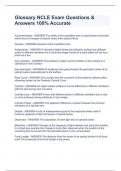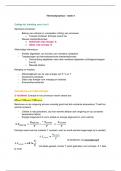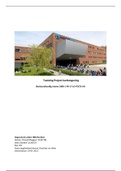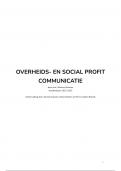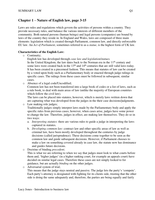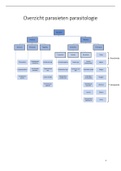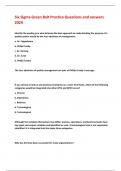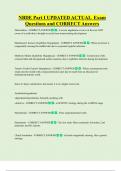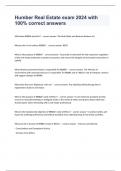Case study: Angola
● After fighting a war of independence for nearly 13 years (between 1961 and 1974),
Angola was plunged into a civil war between warring nationalist movement immediately
afterwards
● The main parties were the MPLA, the FNLA, and UNITA
● The war began in 1975 and continued for another 27 years, largely due to the
intervention of foreign powers
● As they had done in the Congo, the USA and the USSR exploited the situation in Angola
to further their Cold War rivalry
○ They did not fight each other directly to gain control of Angola and extend their
power into Africa, but used proxies to fight for greater influence on the continent
● Cuba intervened on behalf of the USSR by providing military support towards the
Soviet-leaning faction in Angola (the MPLA)
● South Africa and (to a limited extent) China intervened on behalf of the US, providing
military support to Western-leaning factions in Angola (UNITA & the FNLA)
How African was drawn into the Cold War
● The decolonisation taking place in Africa during the 1960s overlapped with the Cold War
between America and the Soviet Union
● The granting of independence to African countries opened up the African continent to
the US and the USSR
○ Many of the new countries being formed in Africa were geographically located in
strategic places or had rich natural resources, which attracted both superpowers
● The two superpowers never fought a war directly, but the Cold War resulted in many
actual wars being fought in Third World countries
○ The USA and the USSR used the Third World to fight each other indirectly
● Africa was drawn into the Cold War because the US and the USSR involved themselves
in the liberation struggles of African countries
○ The two superpowers did this with the aim of securing control over the resources,
territory and people of the continent
● Some of the newly independent African countries were largely unstable and were far
from strong, and were thus vulnerable to being used like pawns in the Cold War
○ However, this also meant that Africa played an ever increasing role in the cyclical
tensions of the cold War, changing global politics for all time
● The newly independent African countries had their own agenda which affected not only
the focus but also the make-up of the UN:
○ African countries wanted the UN to emphasise universal independence for states
that were still under colonial rule, which resulted in the setting up of a special
committee for dealing with colonialism
,Spheres of Influence
Trade
● At the end of WW2, the USSR began sponsoring governments that adopted communism
or socialism
○ These countries came under the USSR's sphere of influence
● In the same way, countries that were capitalist and relied on the US for post-war
development aid came under the USA's sphere of influence
● The US and the USSR each protectively controlled trade within its sphere of influence, in
order to prevent its opponent from becoming more power
● Angola was a newly independent country rich in natural resources such as oil, diamonds
and fertile land
○ Both the US and the USSR wanted to bring it under their sphere of influence in
order to monopolise the trade in these resources
● Both superpowers were worried that if one side came to control Angola, the other side
would "lose" the Cold War
Conflict and aid
● As a result of the emergence of the atomic bomb and the threat of nuclear war, it
became a matter of urgency to maintain a "balance of power" for both sides in the Cold
War
○ If one superpower's sphere of influence grew larger than the other superpower's,
it effectively had a greater position and could eat away at the other's base of
power
● The US and the USSR wanted to have control over Angola to gain the upper hand
● The two superpower tried to establish, and later strengthen, their respective spheres of
influence by offering aid packages to countries
○ These aid packages included things such as food, the sponsoring of
infrastructure and huge cash loans for development
● In the case of Angola, the aid both sides gave their allies in the country came in the form
of military equipment and assistance
● 4 April, 1949 - NATO was established
● 14 May, 1955 - The Warsaw Pact was signed in response to NATO
● NATO and the Warsaw Pact represented the US's and the USSR's spheres of influence
● After independence, Angola signed the Warsaw Pact, which meant it effectively fell
under the USSR's sphere of influence
○ The USA's anxiety over this event was one of the major reasons why Angola was
pulled into the Cold War
, Unit 2: Angola - Colonialism
➔ From the mid-1500's, the Portuguese had established presence in Angola
➔ Portugal did very little in terms of of developing Angola, but used the land to benefit the
economy of Portugal
➔ Angola was also the colony that brought the Portuguese the most wealth, as it produced
sugar; coffee; oil; maize; diamonds; cotton and a range of minerals
➔ The Portuguese imposed forced labour on their subjects, believing that Africans were
meant to do hard labour for the ruling minority
➔ The struggle for independence started in the 1950s after Angola was reclassified as an
overseas province of Portugal
➔ By the 1960's, demands for self-determination by the Angolan people were still being
ignored by the Portuguese regime. This lead to a bitter and bloody war of independence
in Angola between 1961 and 1974
Colonial rule in Angola
● Many of the problems in Angola was based on colonial exploitation
● There was increasing tension in the late 1950s between Angolans and the Portuguese
settlers
● However, this tension was aggravated when the Portuguese government sent more
Portuguese settlers to live in Angola during this time
○ These settlers refused to do what they considered to be menial (unskilled) tasks,
such as farming
● Many of the settlers in Angola lived better lives than they did in Portugal
○ The settlers used African forced labour for menial jobs, which continued colonial
dominance
● Portuguese settlers resisted African independence as Portugal was determined to hang
onto Angola for several reasons:
○ Angola's massive mineral wealth, such as oil and diamonds
○ Angola's rich agricultural potential, such as coffee, sugar and cotton
○ The ability of poor Portuguese peasants to live a better life


